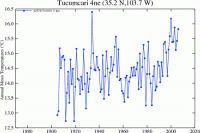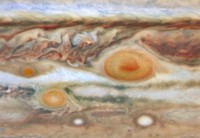Rep. Edward Markey (D-Mass.), chairman of the House (Select) Energy Independence and Global Warming Committee
A top Democrat told high school students gathered at the U.S. Capitol Thursday that climate change caused Hurricane Katrina and the conflict in Darfur, which led to the “black hawk down” battle between U.S. troops and Somali rebels. Markey also told the students that there no longer exists any debate about whether or not disasters like Katrina are caused by climate change. “There now is no question that this harm is being caused by human activity,” said Markey. “It’s warming up the planet and melting the glaciers. There is an underwater heat wave going on. The waters get warmer and warmer and that intensifies the storms and creates even greater havoc when those storms reach land. The planet is running a fever. It’s heating up but there is no emergency rooms for planets,” he said. “The worst consequences affect the planet - not only New Orleans - but the whole planet. Last, but certainly not least, his parting words to the children: “Back 100 years ago, women rose up and said we want the right to vote, and they were successful,” he said. “Now, you are like the green generation and you are rising up and saying we must ensure the planet does not suffer the worst consequences of climate change.” Read more here. Isn’t it strange the chair of the Global warming committee Markey is unaware that the earth’s fever broke in 1998 and ocean temperatures globally have cooled since 2003 according to NOAA buoys.
On the subject of oil, a lot of folks can’t understand how we came to have an oil shortage here in our country. Well, there’s a very simple answer. Nobody bothered to check the oil. We just didn’t know we were getting low. The reason for that is purely geographical.
Our oil is located in:
Alaska
California
Coastal Florida
Coastal Louisiana
Wyoming
Utah
Kansas
Oklahoma
Pennsylvania
Texas
Our dipsticks are located in DC
Any questions? NO? Didn’t think so.
A film by Phelim McAleer and Annn McElhinney
See trailer for the 90 minute film here. Ian Murray of CEI who reviewed the powerful documentary said “Not Evil Just Wrong” looks at how santimony and misunderstanding drove environmentalists to stop Africans from using DDT to help save children’s lives and how the model is repeating itself in the Global Warming debate with even greater tragic consequences. It moved me to tears”. Search the movie on youtube and see how angry even the trailer got the alarmists. Wait til they see the whole story.
Anthony Watts and Steve McIntyre
See in Anthony Watts post with valuable input from Climate Audit’s Steve McIntyre and his commenters what is being behind this station’s temperatures changes.

On Line Opinion Journal
Clive Hamilton, Professor of public ethics at the Centre for Applied Philosophy and Public Ethics, is leading an unethical attack by left-leaning Australian academics on Graham Young and his e-journal On Line Opinion because with the goal of presenting both sides of this important issue, they published articles by so-called ‘climate change denialists’ including Tom Harris and John McLean.
You can read Professor Hamilton here. And then perhaps leave a comment here. See one excellent attempt to communicate with the misinformed professor by John Brosnahan here.
The following youtube segment on ”Saving the Planet” pays tribute to the generally left wing comic George Carlin who passed away recently. Please be advised it contains what may be offensive language to some. He captures the truth with humor.
Reid Bryson who died in his sleep at age 88 on June 11, 2008
Reid Bryson, a towering figure in climatology and interdisciplinary studies of climate, people and the environment, and the founder of the University of Wisconsin-Madison’s meteorology department and Center for Climatic Research, and the first director of the Institute for Environmental Studies, died in his sleep early June 11 at his home in Madison. He was 88.
Bryson was one of the pioneers of modern climatology and was among the first to explore the influence of climate on humans and human culture and, in turn, some of the human impacts on climate. He was an early developer of simple computer models to study the causes of past climate change, comparing those simulations with records of paleoclimate and human culture.

By Garth Paltridge, Emeritus Professor and Honorary Research Fellow, University of Tasmania in the Australian
"I hear on the scientific grapevine that CSIRO’s biggest problem when providing formal advice to the federal Government on the matter of climate change is to say nothing that can be interpreted as giving aid and comfort to the army of irresponsible sceptics out there who are doubtful about the dreadful consequences of global warming.
One can only feel sorry for the Government. Where can it go these days to get unbiased advice on the issue of global warming? Its official sources are poisoned by the fear among many scientists that they may be labelled by their colleagues and by their institutions as climate-change sceptics.
Basically, the problem is that the research community has gone so far along the path of frightening the life out of the man in the street that to recant publicly even part of the story would massively damage the reputation and political clout of science in general. And so, like corpuscles in the blood, researchers all over the world now rush in overwhelming numbers to repel infection by any idea that threatens the carefully cultivated belief in climatic disaster.”
NASA, ESA, M. Wong, I. de Pater (UC Berkeley), et al.
For about 300 years Jupiter’s banded atmosphere has shown a remarkable feature to telescopic viewers, a large swirling storm system known as The Great Red Spot. In 2006, another red storm system appeared, actually seen to form as smaller whitish oval-shaped storms merged and then developed the curious reddish hue. Now, Jupiter has a third red spot, again produced from a smaller whitish storm. All three are seen in this image made from data recorded on May 9 and 10 with the Hubble Space Telescope’s Wide Field and Planetary Camera 2. The spots extend above the surrounding clouds and their red color may be due to deeper material dredged up by the storms and exposed to ultraviolet light, but the exact chemical process is still unknown. For scale, the Great Red Spot has almost twice the diameter of planet Earth, making both new spots less than one Earth-diameter across. The newest red spot is on the far left (west), along the same band of clouds as the Great Red Spot and is drifting toward it. If the motion continues, the new spot will encounter the much larger storm system in August. Jupiter’s recent outbreak of red spots is likely related to large scale climate change as the gas giant planet is getting warmer near the equator.

See larger image here
Tim Palmer, Modeler from the European Centre for Medium-Range Weather Forecasts in Reading, UK
Politicians seem to think that the science is a done deal,” says Tim Palmer. “I don’t want to undermine the IPCC, but the forecasts, especially for regional climate change, are immensely uncertain.” Palmer is a leading climate modeller at the European Centre for Medium-Range Weather Forecasts in Reading, UK, and he does not doubt that the Intergovernmental Panel on Climate Change (IPCC) has done a good job alerting the world to the problem of global climate change. But he and his fellow climate scientists are acutely aware that the IPCC’s predictions of how the global change will affect local climates are little more than guesswork. They fear that if the IPCC’s predictions turn out to be wrong, it will provoke a crisis in confidence that undermines the whole climate change debate.


